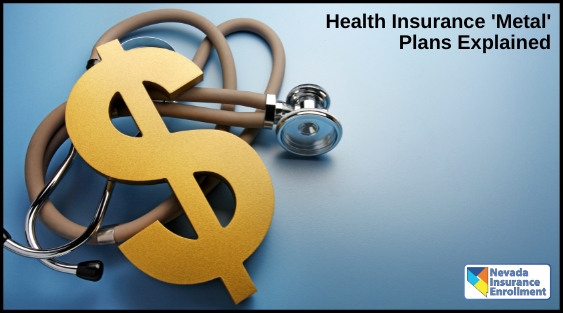What Is the Difference Between the Metal Plans?
PLATINUM | GOLD | SILVER | BRONZE
From 1/1/2014 on, all individual and family health insurance plans will have these “Metallic” names whether you purchase health insurance “On Exchange” or “Off Exchange”. It gives you an easy-to-understand overview of how the plans will share the payment of your medical bills.
Health insurance companies that sell plans on the Health Insurance Marketplace can offer four types of qualified health insurance plans, including Bronze, Silver, Gold, and Platinum. The plan you choose determines not only the premium you pay but also what portion of your health costs you pay.

To make it easier to shop for coverage, health insurance plans have standardized “metals”. The “metal” plan depends on its actuarial value, or the average percentage of health care costs the plan pays vs what the member pays. The more coverage a plan provides, the higher the monthly premium and the fancier the metal level. Gold is better than Silver. Silver is better than Bronze.
-
Platinum plans cover 90% of medical expenses
-
Gold plans cover 80% of medical expenses
-
Silver plans cover 70% of medical expenses
-
Bronze plans cover 60% of medical expenses
This percentage will not go on forever, there is always an “Out of Pocket Maximum” (this is your pocket, not the insurance company), so you’ll only pay your portion of the expenses until you’ve reached your out-of-pocket maximum.

The Out-of-Pocket Maximums for 2023 are:
Individuals: $9,100 Families: $17,400
You’ll want to review your “Summary of Benefits and Coverage” to find out what your deductible is, your co-insurance, your out-of-pocket maximum, along with all of the important details of what your plan covers.
What Do the Health Insurance Plans Cover?
Regardless of the plan you choose, it will provide all 10 essential health care benefits guaranteed to policyholders under the Affordable Care Act. The difference among the plans has to do with how much overall out-of-pocket costs you’ll pay up to your out-of-pocket maximum.
Choose the Right Health Plan with Nevada Insurance Enrollment
Choosing the right metal tier requires evaluating your budget and assessing current and expected health care needs. Our agents guide you in reviewing the options available across the tiers and help you determine which plan best fits your health needs and budget. We can also help you determine whether you qualify for subsidies to lower your premium.
Recent Posts

How Financing Your Car Affects the Insurance Premium
However, you may end up paying a higher premium than someone who has not financed their vehicle. If you make payments on your vehicle, your lender requires you to have comprehensive and collision coverage on top of the state minimum requirements.




Adding Uninsured / Underinsured Motorist To Your Policy
Uninsured and underinsured motorist coverage is used when you are hit by a driver that has insufficient coverage or no coverage at all. This optional coverage helps to compensate you for damages, up to your policy limit.




What Is Renters Insurance?
Renter’s insurance covers your personal property. If your property is damaged due to a covered peril such as a fire or theft, then you are compensated for your loss up to your policy limits. There are a variety of risks and events covered by renters insurance.
Search This Website
Most Popular Pages
By page visits (this month)
#1) Health Insurance Subsidy Chart
#2) Health Insurance
#3) Health Insurance WITH a Subsidy
#4) Insurance Blog
#5) Request a Quote
Top 5 Most Popular
By page visits (this month)
#1) Health Insurance Subsidy Chart
#2) Health Insurance
#3) Health Insurance WITH a Subsidy
#4) Insurance Blog Posts
#5) Request a Quote
Recent Posts
At Fault – If You Caused an Auto Accident
The responsibility of who pays what in Nevada is contingent on who’s at-fault in an auto accident. All drivers in Nevada have an obligation to drive their automobiles safely to reduce any risks of potential accidents. In Nevada, if you are the at-fault driver (the person that caused the accident), then you are responsible to “make whole” the individual or property you hit.
I Witnessed A Car Accident; What Do I Do?
A car accident can happen in the blink of an eye and witnessing one can be scary. After an auto accident, all drivers involved are required to stay at the scene where information is exchanged for auto insurance purposes. But what should you do if you witness a car wreck?
Accidents / Vandalism: Does Auto Insurance Cover Personal Belongings?
Personal items such as a tablet, wallet, or any personal valuables are not generally covered in your auto insurance policy. Those items would be covered in your homeowners/renters policy. You would have a deductible to pay for first, and then you’d need to consider the consequences of a claim on your homeowners policy.
Windshield / Glass Coverage
Windshield / glass coverage pays the amount of a covered glass loss, and as an added perk, it has a low deductible. Your insurer will cover the full costs of the repairs up to your policy limit, and as long as the costs of the damages don’t exceed your coverage limit, you’ll pay only your small deductible.